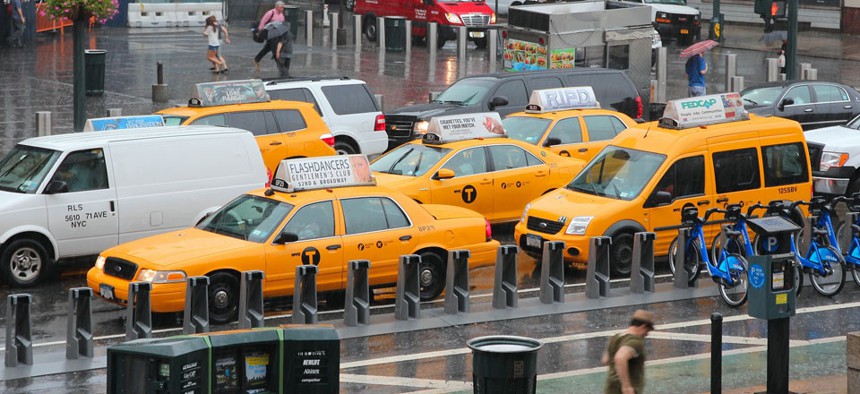Why New Yorkers Can't Find a Taxi When It Rains

Tupungato / Shutterstock.com
Cabbies might quickly make enough to call it a day. Or they might not think it's worth it to be out at all.
You have to live in New York City for precisely one rainy day to appreciate that it's extremely difficult to find a taxi in New York City when it rains. It's also extremely difficult to figure out why that's the case. Sure, there might be more people looking for a cab when it rains, but New York is a place that ceaselessly aims to satisfy all desires, reasonable and twisted alike. So if there are more people out there looking for a cab, you'd expect there to be more cabs out there looking for people.
You are not alone in your confusion. Scholars who study economic behavior for a living have trouble understanding what's going on here themselves. Inspired by a new study of the subject, we'll look at two leading theories.
The first concept, courtesy of Cal Tech behavioral economist Colin Camerer, is known as "income targeting." It's pretty straightforward: Cab drivers strive for a certain amount of income each day, and once they hit that target, they call it quits. That means on good days, a cabbie can knock off earlier. Camerer explains in a 1997 article in Engineering and Science:
So income targeting perversely predicts that cabbies are going to quit earlier on good days. If you want to make $150 and you're earning $25 an hour (which would be a pretty good day for these guys), you can go home after six hours. But on a bad day, when you're earning $15 an hour, you've got to drive 10 hours.
Camerer and some research collaborators analyzed 3,000 taxi meter readingsto compute driver earnings and found strong support for income targeting. Since rainy days should be "good" days from a cabbie's perspective—what with the abundance of potential fares—taxi drivers presumably meet a target more quickly and head home. Thus leaving more New Yorkers hailing in vain in the rain.
But the idea of "income targeting" comes under fire in a new working paperfrom Princeton economist Henry Farber. With the complete five-year record of New York City taxi movement from 2009 to 2013 at his disposal, Farber paired a subsample of these data (amounting to more than 116 million trips) with hourly rainfall data in Central Park over the same period. This analysis found no significant correlation between a driver's hourly wage and rain in the city. That alone is enough to discredit the idea of income targeting, argues Farber, since it means that drivers don't earn more when it's raining, and therefore have no incentive to quit early.
But the finding raises problems of its own: namely, all those people with an umbrella trying to hail a cab. So if taxi demand is higher during storms, why aren't wages also higher? Farber's short answer is that driving in the rain is extremely unpleasant. Traffic drags; cabs travel about 2.4 percent fewer miles with a passenger when it's raining, according to Farber's figures. So cabbies do quit early—indeed, Farber calculates that there are about 7 percent fewer cabs on the road when it's raining—but money has little to do with it:
Some drivers stop, but this is not due to their reaching their income target. Some drivers stop simply because it is less pleasant to drive in the rain and there is no additional benefit in continuing to drive.
The intellectual debate over why it's so hard to get a cab in the rain will go on, like so many unrequited wrist flicks, but there's an end in sight to the practical problem. In the short-term, expect rainy periods to be dominated by e-hail services like Uber that charge surge prices during high-demand times. Surge pricing raises concerns about equity and consumer fairness, especially when taxis are considered part of the city's broader transit network, but the chance to make a boatload is certainly enough to draw drivers to the streets.
In the long-term, the problem could go away entirely with the emergence of driverless taxi fleets. Robots will neither care about meeting an income target nor worry that driving in the rain is no fun. At least not the ones that want to get a job in this town.
(Image via Tupungato / Shutterstock.com )





